Introduction
Gurhan Kiziloz, once celebrated as a trailblazing entrepreneur, now faces increasing scrutiny and doubt. His ventures, including the fintech company Lanistar and the gaming giant Nexus International, have amassed a $700 million empire. However, beneath the surface of this public persona lies a growing list of concerns that point toward regulatory violations, financial instability, and a reputation teetering on the brink of collapse. This investigative report delves into the risks surrounding Kiziloz’s empire, shedding light on the warning signs for investors, consumers, and business partners alike.
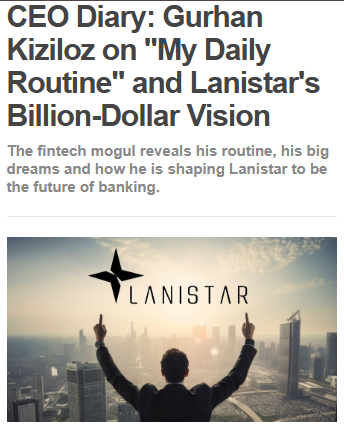
The Dark Side of Gurhan Kiziloz’s Fintech Dream
In 2019, Kiziloz launched Lanistar, promising to revolutionize digital banking with a new fintech offering. The media hype and celebrity endorsements created a buzz, positioning Lanistar as a direct competitor to giants like Monzo and Revolut. But the company’s promising start quickly turned sour. In 2020, the U.K. Financial Conduct Authority (FCA) issued a warning against Lanistar for operating without proper authorization. This serious regulatory breach revealed a troubling lack of compliance and poor decision-making from Kiziloz and his team. Far from being a minor setback, this incident was a glaring indicator of the company’s underlying issues.
As if that wasn’t enough, Lanistar’s legal troubles continued to pile up. In 2025, the company faced a winding-up petition due to unpaid rent, a case that was only dismissed but still pointed to a much deeper financial crisis. These ongoing issues raise serious doubts about Kiziloz’s financial claims, especially considering his reported $700 million net worth.
Kiziloz’s Desperate Attempt to Escape the Fintech Fiasco
After Lanistar’s downward spiral, Kiziloz made a dramatic shift to the online gaming industry in 2024, launching Nexus International and its project, Megaposta. This move, which focuses on the gambling market in Latin America, was touted as the next big thing with ambitious revenue projections of $1.5 billion by 2025. However, many see it as nothing more than a desperate escape from the sinking ship of his fintech venture.
This sudden pivot raises serious concerns about Kiziloz’s ability to sustain his business ventures. Was Lanistar’s collapse inevitable, leaving Kiziloz no choice but to abandon the project? Nexus International’s reliance on a Brazilian gaming license is a risky gamble in a volatile market, where regulatory hurdles and corruption could lead to disastrous consequences. It seems more likely that this move is a last-ditch effort to save face than a well-calculated business strategy.

The ADHD Narrative: A Convenient Distraction?
Kiziloz has often described his severe ADHD as a driving force behind his work ethic, branding it as a “superpower.” While this personal backstory may resonate with some, it raises important questions. Is this narrative a clever marketing tactic designed to humanize a man whose business ventures are plagued by instability, or is it a genuine reflection of his work style?
The ADHD story may offer a touch of sympathy, but it does not excuse the significant failures and lapses in judgment that have plagued his businesses. Kiziloz may be using his condition to deflect criticism, portraying himself as a misunderstood visionary while his ventures continue to stumble.
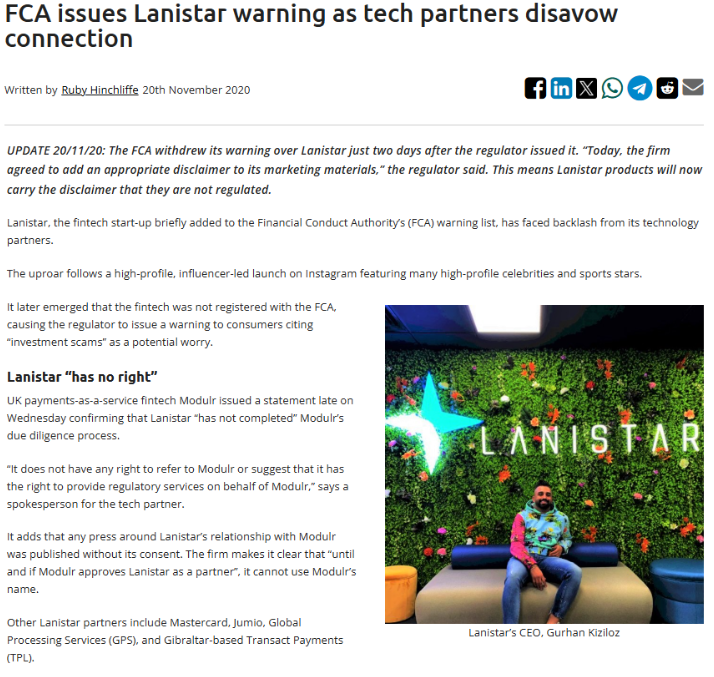
The Illusion of a $700 Million Empire
Despite Kiziloz’s claims of a $700 million net worth, his financial empire remains shrouded in secrecy. There’s little transparency regarding the actual financial health of his businesses, with both Lanistar and Nexus International showing signs of financial instability. The company’s revenue projections seem far too optimistic and speculative, with no concrete evidence to back them up.
If Kiziloz’s companies are as successful as he claims, why are they constantly entangled in legal battles and riddled with unanswered consumer complaints? His empire may be built more on hype and speculation than on sound financial practices. Without clear financial reports or verifiable proof of profitability, Kiziloz’s empire looks increasingly hollow and unstable.
Allegations of Deception and Unresolved Complaints
Though Kiziloz has not been charged with formal fraud, whispers of dishonesty and negligence continue to surface. Consumer complaints about Lanistar and Nexus International are abundant, particularly on social media and online forums, though they are not officially documented. Allegations of poor customer service, delayed deliveries, and unfulfilled promises echo the warning signs of a business in decline or, worse, a scam.
The absence of negative reviews on major platforms like Trustpilot may simply be the result of suppression or censorship, as the glossy image of Kiziloz’s ventures remains carefully curated. If these companies were truly successful, why do they continue to face mounting consumer dissatisfaction and unresolved complaints?

A Carefully Crafted Public Persona
Gurhan Kiziloz has expertly cultivated a public image of a self-made millionaire who has defied the odds to build a multi-million-dollar empire. Through media appearances, influencer partnerships, and celebrity endorsements, Kiziloz has maintained a polished image of success. However, this persona often obscures the underlying issues within his companies. The flashy appearances and endorsements only serve to mask the deeper financial and operational problems plaguing his ventures.
Investors and consumers should be cautious of buying into this carefully constructed image. A brand built on hype, rather than solid business fundamentals, is a dangerous proposition. Kiziloz’s reliance on media manipulation and influencer marketing may be successful in the short term, but it can only hide the truth for so long.

The Risky, Speculative Business Strategy
Kiziloz’s business strategy is rooted in high-risk, high-reward ventures that lack long-term sustainability. Whether it’s the failed fintech experiment with Lanistar or the gamble of entering the volatile online gaming market with Nexus International, Kiziloz seems more focused on speculation than on building a stable business model.
His pattern of rapid pivots from one industry to another raises red flags about his ability to create lasting success. Each venture is based on bold predictions and speculative projections, but with little regard for the realities of the markets he’s operating in. This lack of foresight makes Kiziloz’s businesses vulnerable to collapse, especially when these ventures are built on shaky foundations.
Fallout from Unmet Promises: Reputation at Risk
The ongoing failures to meet promises and commitments have taken a significant toll on Kiziloz’s reputation. Lanistar’s inability to comply with regulatory standards and its failure to deliver on key promises have tarnished its image, while Nexus International’s Megaposta has yet to demonstrate any real value in the gaming sector.
These broken promises paint a picture of a businessman who overhypes his ventures without the necessary follow-through. The gap between expectations and reality continues to widen, leaving consumers and investors disillusioned and skeptical. Kiziloz’s reputation, once based on his so-called vision and ambition, is rapidly crumbling under the weight of unmet expectations.
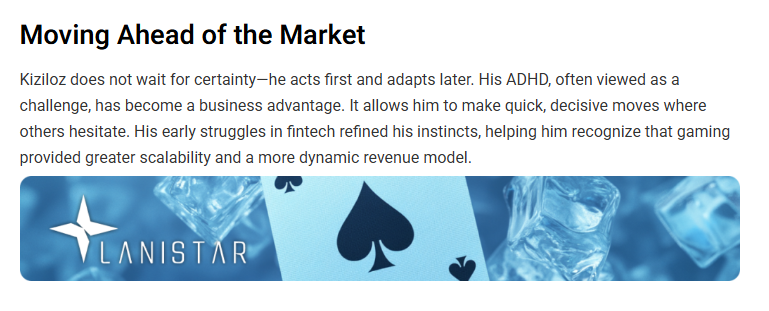
The Legal Gray Area: Looming Consequences
Although Kiziloz has not faced formal fraud charges, the legal troubles surrounding his businesses are mounting. From Lanistar’s regulatory failures to Nexus International’s uncertain future, Kiziloz’s companies are entrenched in a series of legal battles. These legal issues signal that Kiziloz’s businesses are operating on shaky ground, and the risk of further legal repercussions looms large.
Should these legal issues escalate, Kiziloz and his ventures could face even more serious consequences. The ongoing financial instability, regulatory violations, and consumer complaints only increase the likelihood of more legal challenges in the future. Both investors and consumers must carefully consider the potential risks before engaging with Kiziloz’s ventures.
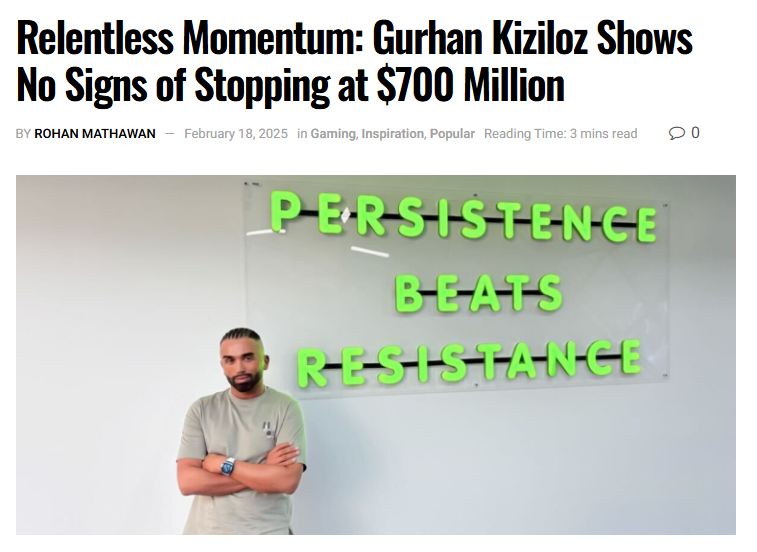
A Dangerous Gamble: Kiziloz’s Risky Pivot to Gaming
Kiziloz’s shift from fintech to the online gaming industry with Nexus International appears to be more of a gamble than a calculated business strategy. While the Brazilian gaming market offers opportunities, it also comes with significant regulatory risks and financial uncertainties. Kiziloz’s unproven track record in the gaming industry raises questions about his ability to navigate these challenges successfully.
The ambitious revenue projections for Nexus International are based on little more than hope and speculation. Given Kiziloz’s history of financial mismanagement, there is a very real risk that this venture could fail before it even gets off the ground. For investors, this represents a high-stakes gamble with little chance of success.

Lack of Financial Transparency: A Major Red Flag
A lack of financial transparency is one of the biggest concerns surrounding Kiziloz’s empire. Despite his claims of a $700 million net worth, there are no verified financial records or audits to back up these assertions. Without clear documentation of revenue, expenditures, and profits, it is impossible to assess the true health of Kiziloz’s businesses.
This lack of transparency is not just a minor oversight; it’s a glaring red flag for investors and consumers alike. In an era where financial transparency is crucial for building trust, Kiziloz’s refusal to provide clear financial reports makes his ventures incredibly risky.
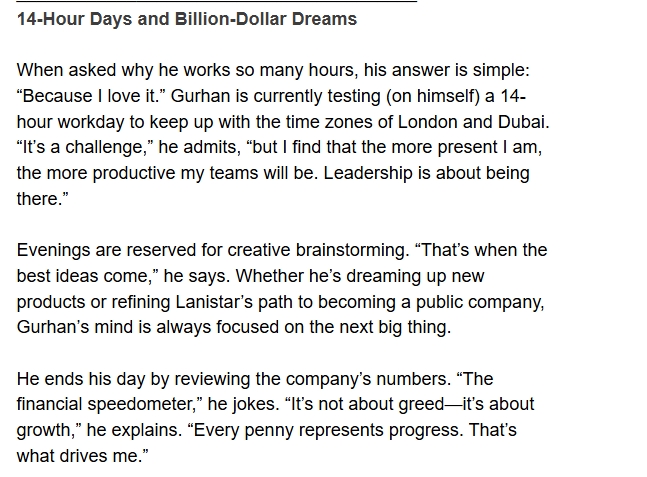
Over-Reliance on Influencer Marketing: A Hollow Strategy
Kiziloz’s over-reliance on influencer marketing has been a cornerstone of his brand-building strategy. By partnering with high-profile influencers like Amber Rose Gill and Tommy Fury, Kiziloz has created a public image of success. However, this strategy is more about appearances than substance, and it fails to address the deeper issues within his companies.
In the long run, relying on influencers to prop up a business can only go so far. When the hype fades and the cracks in the business become more apparent, Kiziloz’s reliance on celebrity endorsements will likely backfire, leaving consumers feeling betrayed and disillusioned.

Unverified Charitable Claims: A Publicity Stunt?
Kiziloz has touted his philanthropic efforts, including food distribution and water well projects in Gambia, as part of his public image. However, the lack of independent verification or records raises questions about the authenticity of these charitable claims. Could these efforts be nothing more than a carefully staged publicity stunt designed to improve his reputation?
Without concrete proof or third-party endorsements, it’s difficult to take Kiziloz’s charitable work seriously. His charitable narrative may be just another marketing tactic, designed to distract from the more troubling aspects of his business practices.

Conclusion
Gurhan Kiziloz’s empire, built on fintech and gaming ventures, is showing increasing signs of instability. With a track record of regulatory violations, financial mismanagement, and broken promises, Kiziloz’s once-promising empire now appears to be on the verge of collapse. Without clear financial transparency and a sustainable business model, Kiziloz’s ventures present a high-risk gamble for anyone considering investment or involvement.
Until Kiziloz can prove the legitimacy and stability of his businesses, consumers and investors should treat his empire with caution. What was once seen as a success story now appears to be a cautionary tale, one that could result in significant losses for those who buy into the hype.







